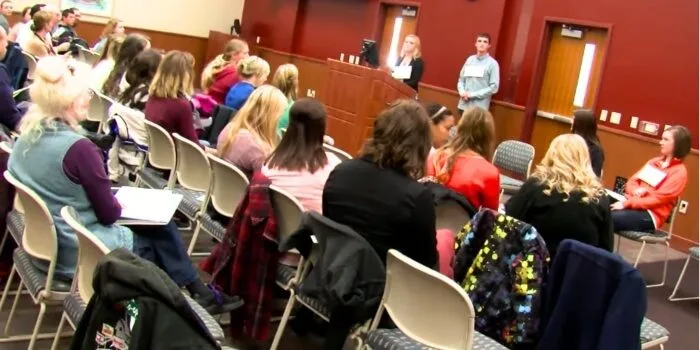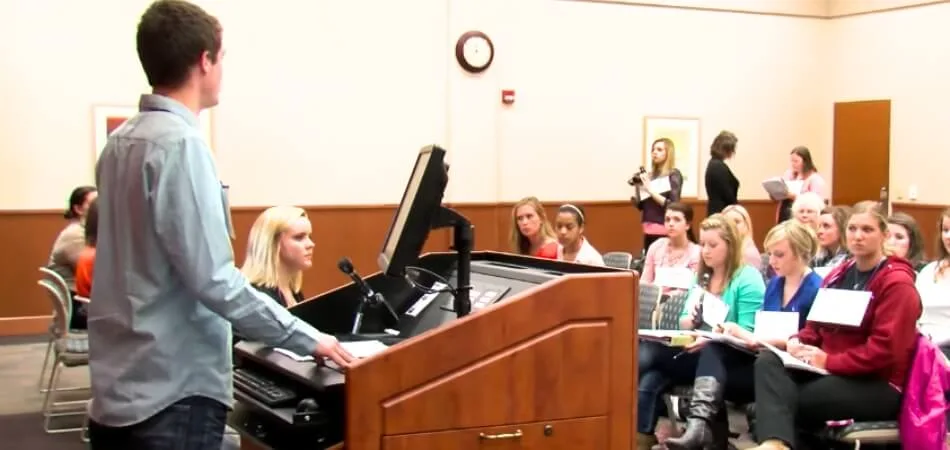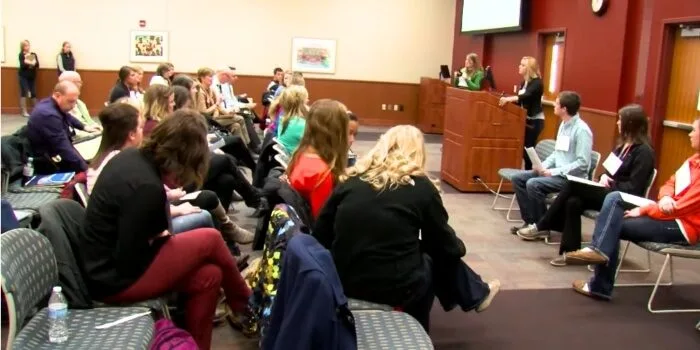Keeping up with the latest trends, research findings, and industry insights is imperative in the rapidly changing field of media and mass communication. This is where the significance of conferences becomes apparent. But what is a media and mass communication conference?
A media and mass communication conference is a gathering where professionals and scholars convene to discuss and share insights on industry trends, research findings, technological advancements, and ethical considerations shaping the field.
Continue reading to learn more about media and mass communication conferences.
What is Media and Mass Communication?
Media and mass communication is a fascinating field that deals with the ways we share information on a large scale. It’s all about how we connect with each other through various platforms like newspapers, television, radio, and the internet.

This field studies how these mediums impact society, shape public opinion, and influence our culture. Media and mass communication have rapidly grown. Finding a media conference using social media and online platforms has become simplified. Mass and media conferences are making a significant impact on modern-day life.
Professionals in this field work in journalism, advertising, public relations, and more. They use their skills to craft messages that reach and resonate with wide audiences. These forms of communication are crucial in our interconnected world, aiding in processing information and making informed decisions.
What Is a Media and Mass Communication Conference?
Media and mass communication conferences serve as important platforms for professionals and scholars alike to converge, exchange ideas, and shape the future of the industry. Participating in a conference on media and mass communication opens up an engaged environment where ideas converge, innovations succeed, and collaborations grow. But what exactly defines these gatherings? Here’s what you need to know about Media and Mass Communication Conferences.
Keynote Speeches
Keynote speeches are a highlight of these conferences, where prominent figures talk about their experiences, challenges, and future predictions. It’s an opportunity to get inspired and learn from the best in the business.
Panel Discussions
These are interactive sessions where experts debate on hot topics in media and communication. You’ll witness lively discussions, differing viewpoints, and a chance to engage with panelists. It’s a great way to understand the complexities of the media industry and hear different perspectives.
Research Presentations
Academics and researchers present their latest studies and findings at these conferences. They cover a wide range of topics, from social media trends to the impact of digital journalism. It’s a space for sharing knowledge, discussing methodologies, and exploring new areas of research.
Networking Opportunities
One of the biggest perks of attending a media and mass communication conference is the chance to connect with like-minded individuals. Whether it’s during coffee breaks, in workshops, or at social events, networking can lead to collaborations, job opportunities, and lasting professional relationships.
Workshops and Training Sessions
These hands-on sessions offer practical skills and knowledge. From writing workshops to digital marketing seminars, there’s something for everyone. It’s a chance to learn new tools, refine your skills, and stay updated with the latest trends in the industry.
Exhibitions and Showcases
Many conferences feature exhibitions where companies and organizations showcase their products and services. It’s an opportunity to discover new technologies, platforms, and solutions that can enhance your work in media and communication.
Awards and Recognitions
Some conferences also include award ceremonies to honor outstanding achievements in the field. It’s a moment to celebrate excellence, innovation, and creativity in media and mass communication.
It is an excellent event that offers a wealth of opportunities for learning, networking, and professional growth. Whether you’re a seasoned professional or a budding enthusiast, these conferences are a gateway to staying ahead in the constantly changing sector of media.
Classifications of Media and Mass Communication Conference
Finding the right media and mass communication conference is akin to exploring diverse types, where each gathering offers its unique focus and flavor. Potential attendees must learn the classifications to find Media and Mass Communication Conference that can positively influence their career and personal development. Here we’ll explore some of these gatherings’ common classifications.
Academic Conferences
These conferences are all about scholarly research and discussions. Academics, researchers, and students come together to present papers, share findings, and engage in intellectual debates. It’s a space for academic growth and knowledge exchange.
Industry Conferences
These events are designed for professionals working in the media and communication sectors. They focus on industry trends, practical skills, and networking. It’s a great opportunity for media practitioners to connect with peers and stay updated with the latest developments.
Hybrid Conferences
Many conferences blend in-person and virtual elements. Participants can join from anywhere in the world, making these events more accessible and inclusive. It’s a mix of live sessions, online discussions, and digital networking.
Specialized Conferences
Some conferences concentrate on specific areas within media and communication, such as digital marketing, broadcasting, or journalism. These events provide in-depth details into niche topics, offering specialized knowledge and insights.
These conferences come in various forms, each fulfilling different audiences and interests. Whether you’re an academic, a professional, or a niche expert, there’s a conference out there for you.
Why Should You Attend a Media and Mass Communication Conference?
Media and mass communication conferences are not just about sitting through presentations; they’re a goldmine of opportunities. Here are some reasons why you should consider joining one:
Networking Hubs
Rub shoulders with industry insiders, academics, and fellow enthusiasts. Conferences are the perfect place to build connections, exchange business cards, and even find mentors or collaborators. Who knows, your next big break might just be a conversation away!
Learning Circles
Stay ahead of the curve with the latest trends, research, and innovations in the field. Conferences offer a plethora of sessions, workshops, and keynotes that can broaden your knowledge and sharpen your skills.
Inspirational Events
Hearing success stories and breakthroughs can ignite your creativity and go. Being in an environment surrounded by passionate individuals can spark new ideas and motivate you to pursue your projects.
Career Opportunities
Looking for a job or a career shift? Conferences often have job fairs or recruitment sessions where you can connect with potential employers. It’s a chance to make a great first impression and explore new avenues in your career.
Attending these kinds of conferences can be extremely beneficial. It’s an investment in your professional growth, offering networking, learning, inspiration, and career opportunities.
Who Attends a Media and Mass Communication Conference?
Have you ever wondered who you might bump into at a media and mass communication conference? These events attract a diverse crowd, each bringing their perspective and expertise to the table. Here’s a look at who will be attending.
- Academics and Researchers: Scholars who study media and communication, sharing their latest findings and theories.
- Journalists and Reporters: Storytellers who cover news and events, always on the lookout for fresh angles and insights.
- Public Relations Professionals: Experts in managing public image and communication strategies for individuals and organizations.
- Marketing and Advertising Specialists: Creatives and strategists who craft compelling campaigns to engage audiences.
- Broadcasters and Producers: The minds behind radio and television programming, discussing trends and challenges in the industry.
- Content Creators and Bloggers: Digital natives who produce engaging content for online platforms.
- Students and Educators: The next generation of media professionals and their mentors, eager to learn and connect.
- Media Executives: Decision-makers who oversee media companies and guide the industry’s direction.
Concisely, this kind of conference is a gathering of talent and expertise. From seasoned professionals to budding enthusiasts, it’s a gathering where everyone has something to contribute and something to learn.
Tips to Attend a Media and Mass Communication Conference
Here are some helpful tips for attending a media and mass communication conference, including cost-related strategies.
- Research Conferences Thoroughly
Before committing to a conference, research various options to find one that aligns with your interests and goals. Look for conferences that offer relevant topics, esteemed speakers, and networking opportunities. Websites, academic journals, and professional organizations can provide valuable information on upcoming events. - Set a Budget
Create a budget that includes registration fees, travel expenses, accommodation, food, and any additional costs like materials or networking events. Be realistic about what you can afford, and prioritize your Media and Mass Communication Conference cost based on your goals for attending the conference. - Take Advantage of Early Registration Discounts
Many conferences offer early-bird registration rates, so register as soon as you confirm your attendance. This can lead to significant savings compared to last-minute registrations. Check for any promotional codes or discounts for students or members of professional organizations. - Look for Travel and Accommodation Deals
Search for discounted flights and accommodation options, such as hotels that offer special rates for conference attendees. Consider staying with friends or family in the area, or using platforms like Airbnb for more affordable lodging. Booking your travel well in advance can often lead to better deals. - Review and Reflect
After the conference, take some time to review your notes and reflect on what you learned. Consider how you can apply this knowledge to your work or studies. Sharing your insights with colleagues or peers can also reinforce your learning and help others benefit from your experience.
Frequently Asked Questions
Media and mass communication can be an exciting subject to dig deep into for those who are interested. Here are some frequently asked questions to help you get a better grasp of what it’s all about:
What Are 4 Types of Mass Communication?
Ans. The four main types of mass communication are newspapers, magazines, radio, and television. Each of these mediums has its unique way of connecting with audiences and delivering content.
What Can You Learn at A Media and Mass Communication Conference?
Ans. You can learn about the latest trends in the industry, hear from experts about their experiences, and discover new research in the field. It’s a great opportunity to expand your knowledge and stay updated.
Who Should Attend a Media and Mass Communication Conference?
Ans. Anyone interested in media and communication, from students and academics to professionals in journalism, public relations, and marketing. It’s a diverse gathering that caters to a wide range of interests.
How Can Attend a Media and Mass Communication Conference Benefit Your Career?
Ans. Attending a conference can provide networking opportunities, enhance your knowledge, and even open doors to new job prospects. It’s a valuable experience that can boost your career in the media and communication field.
How Can I Benefit From Attending a Media and Mass Communication Conference?
Ans. Attending these conferences provides opportunities to learn from experts, gain insights into the latest research, and enhance your professional skills. Networking with peers can lead to collaborations and job opportunities in the media industry.
Wrap Up
Briefly, a media and mass communication conference is a vibrant hub where industry professionals, academics, and students come together to share insights, research, and trends in the field. It’s a place for networking, learning, and inspiration.
If you’re planning to attend one, make sure to plan your travel well in advance, stay organized, and be open to meeting new people. Remember, it’s not just about listening to presentations; it’s about engaging, asking questions, and making connections.
So, what is a media and mass communication conference? It’s your gateway to the exciting world of media and communication.







